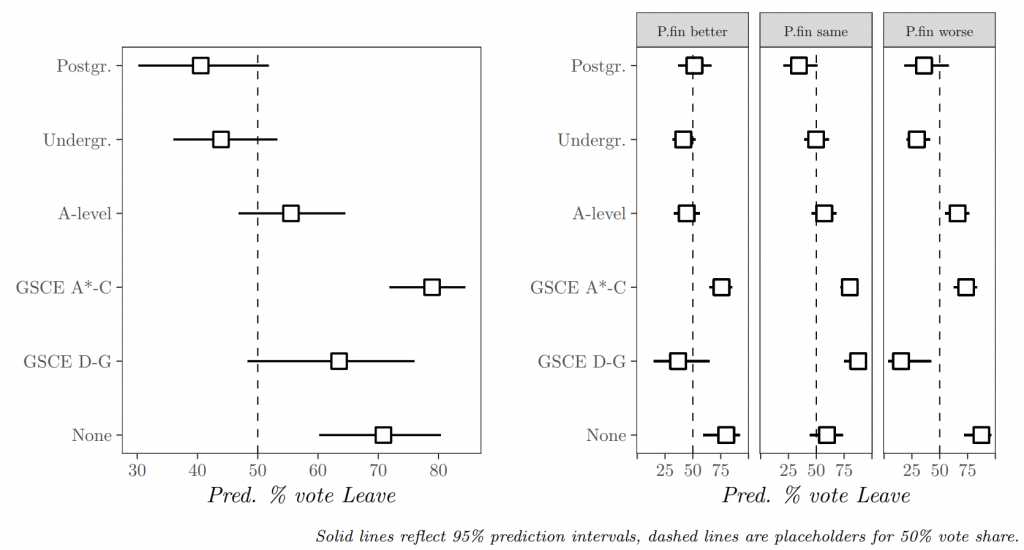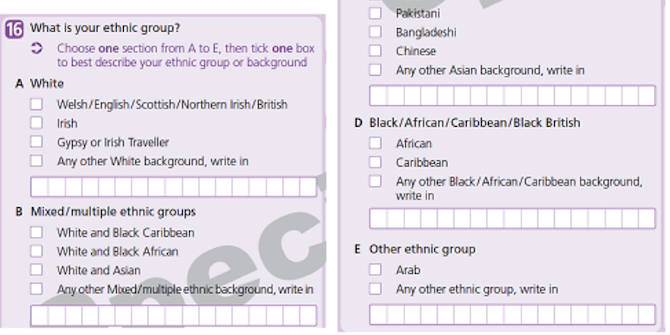

 Lorenza Antonucci, Laszlo Horvath, and André Krouwel challenge the popular view of Leave voters as those left behind educationally and financially. They explain why it is individuals from an intermediate class, whose financial position has been declining, that represent an important section of the Brexit vote.
Lorenza Antonucci, Laszlo Horvath, and André Krouwel challenge the popular view of Leave voters as those left behind educationally and financially. They explain why it is individuals from an intermediate class, whose financial position has been declining, that represent an important section of the Brexit vote.
Over the past year or so, Brexit has been interpreted as the symbol of a historical shift to anti-establishment politics, kicking off a surge in the ‘outsider’ vote across Europe and the United States. In line with this narrative, initial interpretations of the vote depicted Leave voters as marginalised segments of the population – both educationally and economically – who had channelled their discontent through the referendum.
Another popular view that emerged is that Brexit was the unified response of the working class which finally found its long-lost voice. Yet subsequent, rigorous analysis showed that the profile of Brexit voters is more heterogeneous than initially thought, and that it includes voters with high education and ‘middle class’ jobs. If Brexit is really connected to socio-economic factors, how do we make sense of this apparent contradiction?
For our own study, we implemented a unique set of questions in a post-referendum survey, focusing on the ‘ordinary Brits’ – the intermediate class. This intermediate class refers to ‘ordinary’ families with intermediate or upper-intermediate levels of education, stable jobs, and median levels of income, but which nonetheless face an increasing challenge in maintaining their life-style. This term is preferred to the popularised understanding of class in the UK, which opposes the ‘working class’ to the ‘middle class’. Echoing what Joan Williams has stressed in her analysis of Trumpism, public debates discussing the popularity of populism amongst the working class in most cases refer to the impoverished middle class, rather than the poor and the left behind. Our argument is that, rather than representing the ‘left out’, Brexit was the voice of this intermediate class who are in a declining financial position. This category of voters represent a group of high sociological relevance also labeled as ‘the squeezed middle’.
Brexiters: the least educated voters?
The left-out argument has been constructed around voters whose low levels of education render them unable to compete with those with a university degree in the globalised economy. Academic research has already argued against this. For example, Goodwin and Heath show that voters with A-level education from low skilled communities had similar pro-Leave voting profiles to those with no education. With this in mind, the first set of our models looks at the probability of voting Leave within a number of educational categories, and also explores the combined effect of education with financial circumstances.
In all specifications of our regression models, we also include gender, age, and 2015 GE vote as individual level predictors, as well as cluster respondents within 11 UK regions to account for the geographical variability in the Leave vote. Samples sizes vary for these models between N=1,473 and 1,382.
Figure 1. Predicted probabilities by education (left panel) and by perceived change in financial situation (right panel).
Our findings confirm a negative relationship between education and voting Leave: the higher the level of one’s education, the lower the likelihood of them voting Leave. Our findings, however, reject the dichotomous view of the low-educated Brexiter vs the high-educated Remainer, by showing that two groups with intermediate levels of education (voters with good GSCEs and A-levels) were more pro-Leave than the low-educated (those with no formal education and with low GSCE grades).
Looking into how personal finances have changed within these education categories, we find an interesting dynamic (Figure 1). While worsening financial conditions increased the probability of voting Leave, the effect of stagnation is ambiguous. In our model, respondents with A-levels slide towards a Leave vote as their economic conditions worsen. Our model also predicts that those with lower grade GSCEs would vote Leave only if their economic conditions had not changed.
Challenging the myth of Brexit as a working class vote
A second set of models presents the impact of self-assessed social class membership and income on voting Leave. In other respects, these models are identical to the previous by controlling for individual-level demographics as well as geographical clustering. Our sample sizes, however, drop significantly as we had to recover these variables from previous waves of data collection, down to 279, meaning these results must be read with caution.
Looking at class first, we find the Leave vote to be associated with middle class identification and the more neutral ‘no class’ identification. But we find no evidence of a link with working class identification.
Self-assessment of class presents obvious limitations, but our findings become even more relevant if we consider that Britons tend to identify themselves as working class – even when holding middle class jobs. This analysis does not rule out the popularity of the Leave vote within particular working class communities, but it aims to show that the Leave vote is far from being the expression of a singular and conscious working class, as commentators assume. It instead confirms that the middle class support was very relevant to the Brexit outcome – perhaps the predominant group behind Brexit, as argued by Dorling.
We then turn to analyse whether Brexit has been supported by an intermediate group in objective terms. In order to do this, our models tease out the proportion of Leave voters within income categories. The result is partly similar to previous reports in that higher income would link to the Remain vote. Still, it is only the top quantile – the richest respondents – who slant significantly towards Remain. But we do not find enough evidence to show that the effect of income is incremental: that the intermediate class would be more likely to vote Remain than the poorest groups (Figure 2).
Figure 2. Predicted probabilities by income quantiles and class identification.
So, based on the above, the Leave vote was not more popular among the low skilled, but rather among individuals with intermediate levels of education (A-Levels and GSCE high grades), especially when their socio-economic position was perceived to be declining and/or to be stagnant. These findings point to an alternative narrative to that of the left behind.
This argument of the squeezed middle being behind Brexit raises new questions about how the new politics of inequality influences voting, for it shows that Brexit was the expression of a widely felt social malaise that affects ample segments of the population.
_________
Note: the above draws on a co-authored article, published in Competition & Change (DOI: 10.1177/1024529417704135).
 Lorenza Antonucci is Birmingham Fellow at the School of Social Policy of the University of Birmingham. Lorenza’s research explores the changes in the distribution of welfare sources across European welfare states and their impacts on inequality. She is the author of ‘Student Lives in Crisis‘ (Policy Press, 2016) and she tweets at @SocialLore.
Lorenza Antonucci is Birmingham Fellow at the School of Social Policy of the University of Birmingham. Lorenza’s research explores the changes in the distribution of welfare sources across European welfare states and their impacts on inequality. She is the author of ‘Student Lives in Crisis‘ (Policy Press, 2016) and she tweets at @SocialLore.
 Laszlo Horvath is PhD candidate and Marie Curie Fellow at University of Exeter Q-Step Centre. He tweets at @_lhorvath.
Laszlo Horvath is PhD candidate and Marie Curie Fellow at University of Exeter Q-Step Centre. He tweets at @_lhorvath.
 André Krouwel is associate professor at the Department of Political Science at the Free University (VU) in Amsterdam and is Academic Director of Kieskompas (Vote Compass). His latest book is Party Transformations in European Democracies (SUNY Press, 2012).
André Krouwel is associate professor at the Department of Political Science at the Free University (VU) in Amsterdam and is Academic Director of Kieskompas (Vote Compass). His latest book is Party Transformations in European Democracies (SUNY Press, 2012).
All articles posted on this blog give the views of the author(s), and not the position of LSE British Politics and Policy, nor of the London School of Economics and Political Science. Featured image credit: Pixabay/Public Domain.










I live in a working class area and I am from a working class background. here was a predominately pro-Brexit working class vote in our area. This was brought about by large factories operating schemes to encourage workers to come into the area from Eastern Europe.
There have been incidents where local employment agencies advertised for jobs in the Polish language only, which (not surprisingly) caused resentment amongst English speakers and also non-~Polish Eastern Europeans who believed that they were being discriminated against in favour of Polish people.
Gangmasters have also been a problem with illegal multiple occupations of private rental houses causing pressure on housing, schools and medical facilities.
Of course, in areas without a major influx of Eastern European workers I expect that the arrival of Eastern Europeans is dismissed with a shrug.
The conclusions seem to be flawed. The graphs showing salaries versus voting show <£60k being 75% leave whilst above £60k 25-45% leave. Given that the average UK salary is <£30k and £60k puts you roughly in the top 5%. Therefore, the referendum should have been much clearer for Brexit and not the close outcome that it actually was.
I must admit that I haven’t read ALL the comments, though the article and what comments I read were very interesting. I was intrigued at the disparity of the Scottish results with those of England. I cannot help but feel that the makeup of our tabloid press in England, with huge sales with all but one paper more or less hysterically in favour of Brexit, is a differentiating factor by comparison with Scotland. I would like to see this researched. Also, the age of voters is supposed to be a significant differentiator. I wish schools devoted much more time in showing pupils how to gather and assess information and identify bias and incomplete story telling. We so badly need a savvy electorate.
While l think the explanation sounds reasonable the limitation is that it residualises the effect of education on peoples’ attitudes and world view. As someone who works in education l would like to think it has some lasting impact on the individual otherwise we are wasting our time. In other areas of social science such as Human Capital Theory it has been accepted for decades that education, especially at higher levels, has real world consequences. I think there is also a connection at a deeper instinctive level. The belief in the power of education to promote rationality (and hence prosperity and social progress) is a product of the Enlightenment- just as the EU which aims to overcome nationalism and promote well being through cooperation is also an Enlightenment project. It is clear that the current order is not delivering ina material sense for many people so the underpinnings of the liberal state and those who support it is open to challenge. So explanations which rely solely upon a squeezed middle narrative are not untrue but neither are they the whole truth either.
I was disappointed to find this wasn’t an analysis of the actual referendum results but then would have been concerned if it was possible to draw that much data from a secret ballot.
That said I think it would have been more useful, with either set of data, if you hadn’t maintained the old vague class labels, albeit reinterpreting them.
It would have been much more useful if you had used the A to E categories used by advertising, POLLING, etc to categorise the population
I can’t remember the definitions offhand but the unemployed etc do get their own category, as do skilled tradesmen.
There is more to each definition than that but I hope you get my point, I know from having worked for a polling company that you get different numbers to survey for each group, as well as by age category.
That’s how the commercial world defines & manipulates us.
I think it would help you to use those same categories.
Interesting work though, thanks for that
If it is possible to get actual referendum data & it holds “class” information such as was released, it may hold enough to categorise by commercial segmentation.
Can you have a look if that’s possible & if so consider it as your next piece of research please. I think the results would show a very different picture than previous.
I have seen virtually no mention in the UK press of the fact that 62% of Scottish voters opted to temain. This seems likely to result in the disintegration of the UK in the not too distant future. Voters in Scotland are waiting to see the outcome, but a brexit that does not involve some continuing trading relationship with the EU other than on WTO terms will trigger a request for an Independence referendum by the Scottish government.
You must read strange newspapers – all of those I read state that ‘only Engkland Voted Leave’ and the Celts voted Remain – except that Wales actually voted Leave as well. I really do hope Scotland becomes independent, but it won’t be admitted to the EU on terms as generous as the Scots have in being in the UK. So it will have to – as Alex Salmond said – ‘take its place in the roll of independent nations: yes, between Samoa and Serbia, get on with it please! Can you explain what proportion of trade and exports go from Scotland to the rest of the UK and that which is EU bound?
I have often commented on this in the DT comments sections, but usually get ignored. Regarding Scottish exports, The ratio is said to be about 4 to the UK to every 1 to the EU, so the UK is the larger market by far. Thiis seems very important to me but I am not sure how many people factor in the financials in their calculations regarding independence, apart perhaps from the income from oil which seems much less predicatble now than it did in the past.
Bottom line: If all eligible voters were university educated, Remain would have won the vote.
I don’t think this sort of inference is sound. There is a lot of talk about high correlation between educational level and support for Brexit. But when other variables are controlled for in multivariate studies, educational level is not major explanatory variable to account for the Leave vote by UK districts or by individual vote. When the current older generation were in their youth, only a small percentage went to university and post-16 education was optional, now nearly half of school leavers go onto higher education and education is compulsory up to 18yrs. A 60yr old without university education is not necessarily less well educated (whereby education here is interpreted broadly and includes self-education and reading widely) than a 25yr old with a second-class degree from a university which converted from a polytechnic in the early 1990s. Gaining a degree in the 1970s was relatively elitist and a passport to a decent profession, but getting one in the 2010s is very mundane and many degree holders today end up in jobs not requiring degree level education (https://www.bbc.co.uk/news/education-42923529). Hence the socioeconomic variable of “having a degree” needs to be qualified by the era it was gained. The attribute of having a degree education does not represent a qualitatively consistent metric over the timescale of the past decades. So I am not sure educational level per se is as influential as claimed in shaping attitude to cultural change.
The Leave-Remain vote was tight, and there were many significant variables that motivated voting for one side. Hence a small change of any of these variables could have altered the outcome. (see https://academic.oup.com/pa/article/70/3/439/3109029)
The analysis of statistical data does not provide researchers with causal mechanisms.
Thus knowing how many working class or middle class voters voting for or against Brexit
would not reveal the reasons why they voted in a specific way. In order to understand and
analyse reasons or causal motivation then we need to move to the qualitative level
of analysis. Dr. Eamon O’Doherty
The flaw in this would be idealism, i.e. education level is not only limited by supply but also by demand.
Agreed, I find it insulting to suggest that people with an education would vote Brexit (and equally the horrible comments that imply without an education one is stupid)
When I watched the Referendum votes clicking up in June 2016 I muttered to myself “well, I wonder how long it will be before someone has the time and wit to map the economics and educational demographics of each region against the Leave/Remain vote?” Well, quite a long time……and it still goes on. And in fact more debate and genuine information has taken place since the Referendum than before. Some of the comments I blundered on above demonstrate the total dichotomy of pro/anti EU views. I voted Remain, and increasingly believe leaving the EU is the worst decision since appeasing the Third Reich in 1938. I wasn’t around then, but did live in the US as a teanager, when discussing segregation was as productive as discussing Brexit. Forget facts….misinformation, propaganda and outright lies counted for far more than any measured debate. I’d love to know what cars Tony Sharp’s educated affluent friends drive off in. My educated affluent friends from my posh Golf club all drive off in foreign cars…..most of them voted Leave on principle….but prefer to spend their money employing foreigners to build their means of transport rather than working class Brits. Perhaps this is the dichotomy, the rich don’t want to support the working class, and the poor don’t want to support the elite. So let’s blame Brussels. So 17 million votes out of the 65 million citizens in the U.K.have dragged us into an economic and political gutter which all major parties and most thoughtful commentators….including May, Cameron, Blair, Major, Thatcher…..back to Churchill have deplored. I’m just a moaner….if I lived in the US I’d moan that the affluent educated Californians have to put up with Trump….closely voted in thanks to elderly and not too bright Floridians. I could go on, but my carer is putting me to bed now.
I sat at my school desk in Geography and watched Heathe sign us in to the EEC. My Teacher wasn’t impressed, shouting no man, no. He warned of what lay ahead and I’ve watched it unfold. I voted on the first vote to leave, we lost. I’ve been waiting for another chance, sensing foul play by the media first time around. It On the first time around no one mentioned it. I think the only paper that carried it in the evenings before edition was the Dundee Gazette.
THE English people should at long last commence learning the history of their last colony,the people of this Island have suffered enough over hundreds of years due to British occupation of this Island,they make extremely ignorant comments over and over again,the ordinary English person has been deprived of any knowledge of their wrong doing over centuries of occupation. it should have been finished 1n 1922 and leave in a goodwill and dignified manner, it was not necessary to play the ORANBE CARD,AND NOW AGAIN .We want our Country back,that was surley an Irish slogan copied. I now do not desire a united Ireland, I would like to see equality parrrity of esteem and AS THEY SAY NO HARD BORDERS. We are BRITAINS CLOSEESR NEIGHBOURS AND HAVE CONTRIBTED TO ALL THEIR ARMIES BIG TIME AND EVERY OTHER WALK NOF LIFE IN THE UKN M. I LOVE ENGLANG IE LONDON ESPECIALLY
Figure 2 doesn’t make sense to me. Almost all the categories are highly Leave. Where are the Remain voters in this data set?
I’m an American that visited Europe for the first time in 2014. I noticed a deeply anti-EU feeling that undercut all my conversations with people in England. this paper fully backs up my impression of what people were saying, “the politicians do not care what we think, they only want cheap labor.” When the vote came I fully expected England to vote to leave but when it happened it was as if no media pr political figure could have possibly guessed it. How could I have seen it in 30 days and local politicians cannot?
Education and Common Sense are two different things. You don’t have to be well-educated to have common sense.
The majority of the populace has “Common Sense”, which tells you that self-governing is always greater than being governed from afar.
Cary Michael Cox
‘Common sense’, along with ‘old wive’s tales’ and ‘women’s intuition’, is much overrated and should not confused with ‘informed opinion’.
The US decided that Trump was the best person to represent them – Is that ‘common sense’ in action?
What is put forward as ‘common sense’ can often be based on ignorance and prejudice. In Saudi Arabia, it is ‘common sense’ that women must seek permission from a male guardian to work or travel.
I see – so none of my friends and associates, had an ‘informed opinion’ when we voted Leave? All of us with business interests in Europe, homes there, all of us Oxfbridge graduates, with post grad degrees as well as professionally qualified with successful careers based in central London. Some of us have advised industry wide and also government departments on policy matters and one is a section editor of a weekly news magazine, which has taken a Remain stance against his suggestion of its much respected usual line of balance and neutrality.
But then you clearly misunderstand that ‘informed opinion’ can be held by people without any of those advantages of my personal cohort and that Remain voters have a share ignorance and prejudice regarding the actual arrangements that the EU has created.
It is precisely the attitude of ‘the Establishment knows best, do as we tell you’ that was a major contributor to the huge turn-out for Leave. that has swept most people who informed themselves of the reality
A useful antdote to the prejudiced view of Remainers about ‘thicko’ unskilled Brexiteers. As someone whose personal cohort of friends and associates is exclusively Oxbridge, Post Grad, PhDs and working in the Professions with successful careers we were astonished at this categorisation, as Anti-EU, Eurosceptic Brexiteers. Yet we had really suspedted that any argument the Establishent Remain Lobby had quickly descended into negative, Project Fear and Virtue Posturing claiming xenophoia and even racism to desperatey find a moral basis for their position.
Actually the ‘moral’ position of Remainers is untenable and is either based on ignorance of the practicalities of how the EU operates, what its dynamic is, or the personal advantages that can be garnerd from Careers or Life-Style preferences in supporting for a system which simply created more personal services at reduced rates, an In Work Benefits distortion of the labour market with uncontrolled No-Skill, Lo-Skill work force causing massive disruption to our social and welfare system with negative contribution rates.
What Remainers and essentially the entire Political (all parties), Media, Academic, Civil Service and professional Establishment cannot accept is that after 40 years of unremitting EEC/EU propaganda the majority of the Electorate looked at the issues and Voted Leave because the arguments were not convincing, indeed risible.
In short the Remain camp is completely out of touch with the basic experiences of the results of EU membership.
Agreed, Tony Sharp. The virtue-signalling of the Remain camp began in earnest shortly before the official campaigns and seemed designed to complement Project Fear and to shame floating voters into voting Remain. That it continued after the referendum was unexpected and unnecessarily divisive – unless the expectation was that over half the voting public would take to the streets on their knees, self-flagellating and begging for the chance to withdraw their (our) support for leaving the EU.
It seems those with the most power may well have had such an expectation: the ‘racist’ and ‘xenophobic’ labels were trotted out at every opportunity; ‘opinion-formers’ bandied around suggestions that the votes of ‘older’ voters were illegitimate because of their shorter life-expectancy, that 16-year-olds should have been allowed to vote (why 16 and not some other arbitrary schoolchild age was not explained) because it is ‘their’ future that was being decided, and that ‘big’ decisions should really be left to Parliament because they are too important to allow the great unwashed to have a (binding) say.
The pressure is still there; the deliberate misrepresentation of the motivations, the understanding and the expectations of ‘leave’ voters continues, as does the spoiled tantrum-throwing of the entitled class whose ease of travel-around-Europe-border-free-in-a-day-with-no-rip-off-roaming-charges have been threatened.
What they don’t realise – what the politicians and media, and the bureaucrats of the EU haven’t grasped is – what the Leave voters were rejecting never was just ‘the economy, stupid’.
And yet now, in November, it seems that project fear 2 is painting a picture of blood on the streets if we dare to have a second referendum..because it’s pretty obvious what the result would be. The (few) leave voters I knew seemed to know next to nothing about the way the EU works, but all mentioned Romanian migrants (co-incidentally, the easiest group to stereotype and vilify) in each case, without ever having met one. You post has plenty of heat, Kate, but sheds very little light. You object to labels applied to leave voters, then proceed to crudely stereotype remainers. What are your really about?
Apologies for not having answered you earlier, David Laird. This has only just turned up in my in-box, for some reason.
My anger was not aimed at those who voted remain, as you claim, but clearly at those in positions of power and influence who deliberately misrepresent the views and motivations of the whole 52% of voters who turned out in 2016 to vote to leave the EU.
As that narrative has continued unabated, so does my anger. I did not, and do not ‘proceed to crudely stereotype remainers’. Perhaps you’d care to reread what I wrote and revisit your comment.
@Tony Sharp, I am sympathetic to some of your sentiments here, though I don’t share them. We had 4 decades of EU membership, and during this time, the country had went through enormous social and cultural change, most of which were driven by domestic factors, some by international factors e.g. mass strikes of the 1970s & UK needing IMF bailout, the Thatcher revolution of the 1980s, the onset of Tony Blair’s New Labour & Third Way project in the 1990s, the technology boom & bust at turn of the century, the benign economic conditions in the 2000s until the financial crisis of 2007-2008, followed by the eurozone crisis of 2011-2013, high level of immigration especially from Eastern Europe since 2004, high level of immigration of non-EU nationals in the past decade, property boom of the past 2 decades (creating winners and losers; note that property booms were seen across many countries in the past decade – US, Israel, Australia, New Zealand, Canada, China, Singapore, Hong Kong; hence the property boom in UK is not solely due to domestic factors), austerity policies since 2011. The past decade has been characterised by an exceptional long period of stagnant real wages. Some of these changes were clearly related to the EU, but others were not. Adults 40+ yrs old, would have personal experience of living through these economic and social changes. They are best judge of whether the changes were beneficial or detrimental to themselves. Yet how reliably can they attribute their experiences to EU membership? How much of the dissatisfactions of the Leave voters concerning economic and cultural change of the past decades can be rightly blamed on EU membership? How much of the positive economic and cultural changes of the past decades could be partially attributed to EU membership? I don’t think these questions can be reliably answered by referring to one’s own experience of living through these changes. They require evidence-based approach drawing in evidence beyond one’s personal experiences. Somehow in the run-up the referendum, many voters concluded EU membership was the cause. Yet until the 2010s, judging from decades of publication from the annual British Social Attitudes surveys, EU membership hardly ever featured in the list of concerns among the populace.
Regarding “In Work Benefits distortion of the labour market”: you are referring primarily working tax credits introduced by Gordon Brown as chancellor. Might the blame be laid on domestic fiscal policy rather than EU membership? If so, surely the remedy is altering fiscal policy, not severing EU membership.
I take issue with your jibe about effect of immigration: “Careers or Life-Style preferences in supporting for a system which simply created more personal services at reduced rates”.
EU immigrants have a spectrum of socioeconomic backgrounds. They include highly educated nationals from Western Europe, taking up well-paid jobs in London and other UK cities, as well as low skilled workers in hospitality & restaurant industries, and farm workers. They also include manual workers with skills lacking in the UK labour market e.g. Polish plumbers and electricians. I remember back in 2004, it was so hard to find a plumber in London, and those available charged £50 per half-hour and produced shoddy work. Now it is much easier to find good plumbers, at nominal rates significantly lower than in 2004, yet still at hourly rates well above average salaries. I can appreciate the adverse effect of wages for low-skilled British workers due to influx of low-skilled immigrants. Yet one should not overlook the positive dimension as well – high-skilled and high-paid EU workers contributing higher than average to the country’s tax intake, skilled EU manual workers like plumbers filling a skills gap in the labour market generating benefits for everyone – it is not only the well-off who needs plumbing repairs. EU plumbers electricians and builders also play important role in the construction industry to tackle housing shortages. EU workers in UK’s hospitality industry are typically young and hardworking (and given their youth, are typically in good health, and puts relatively little additional demand on the NHS), and allowed many more good quality restaurants to open, and enhance the culinary scene in British cities. British people across the spectrum of income groups benefit from greater and better culinary services. Migrants use public services, but they also pay taxes which go to paying for public services, and their daily expenditures generate demand for UK businesses which in turn increase demand for labour. Migration has both pros and cons, and the danger is the lack of perspective in balance. In the ideal world, the solution is managed migration. But the reality is the desire for control over EU immigrations runs against the pillar of freedom of movement of labour of the Single Market, the integrity of which many EU countries have strong political motivation to preserve (plus some EU countries benefited greatly from freedom of movement of people). This constraint has to be balanced against the unequivoal benefits of freedom of movement of goods, services and capital, which nobody is against. My criticism of Brexiteers is the lack of perspective in balancing the constraint versus the benefits.